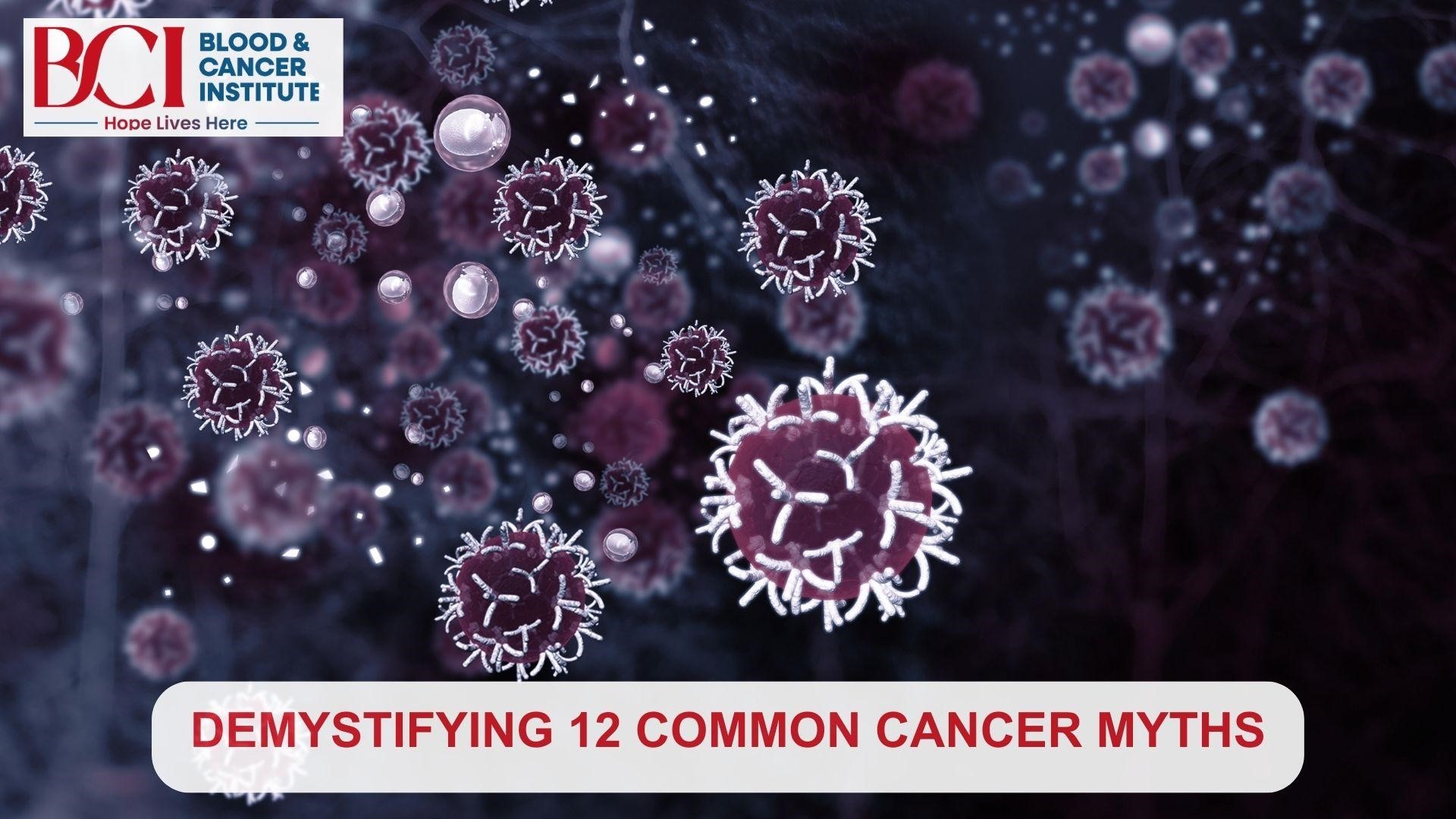
- By : [email protected]
- Blog
- Comments: 0
Demystifying Common Cancer Myths: Insights from Cancer Specialists in Surat
Cancer, a strong opponent in health, has been surrounded by a myriad of myths and misconceptions. These myths, often fueled by misinformation and fear, can contribute to unnecessary anxiety and hinder our understanding of this complex disease. In this blog by our cancer experts at BCI- Blood & Cancer Institute, one of the best cancer hospitals in Surat, we embark on a journey to dispel twelve common myths about cancer, providing clarity and empowering individuals with accurate information.
Myth 1: Cancer is Always a Death Sentence
Fact: While a cancer diagnosis can be daunting, it’s crucial to recognize that advancements in medical science have significantly improved treatment outcomes. Many cancers are now manageable, and survival rates have increased over the years. Early detection, personalized treatment plans, and ongoing research contribute to a more optimistic outlook for individuals facing a cancer diagnosis.
Myth 2: Only Smokers Get Lung Cancer
Fact: According to our lung cancer specialist at BCI- Blood & Cancer Institute, while smoking is a significant risk factor for lung cancer, non-smokers can also develop the disease. Radon exposure, environmental pollutants, and genetic factors play roles in lung cancer development. It’s essential to be aware of various risk factors and not solely attribute lung cancer to smoking.
Myth 3: Cancer is Contagious
Fact: Cancer is not contagious. It cannot be transmitted through touch, sharing utensils, or close contact with someone diagnosed with the disease. Cancer develops due to genetic mutations or environmental factors specific to an individual and is not caused by exposure to a person with cancer.
Myth 4: Sugar Feeds Cancer
Fact: The idea that sugar directly fuels cancer growth is a common misconception. All cells, including cancer cells, require glucose for energy. However, according to our cancer specialist in Surat at BCI- Blood & Cancer Institute, limiting sugar intake is crucial for overall health and can help manage weight, which is a factor in cancer prevention.
Myth 5: Alternative Therapies Alone Can Cure Cancer
Fact: While alternative therapies and complementary approaches may provide symptom relief and support, there is no scientific evidence that they can cure cancer on their own. Effective cancer treatment typically involves a combination of surgery, chemotherapy, radiation, and targeted therapies, personalized to the specific type and stage of cancer.
Myth 6: Biopsies Spread Cancer
Fact: Biopsies, the gold standard for cancer diagnosis, do not spread cancer. In fact, biopsies are essential for determining the type of cancer, its stage, and the most appropriate treatment plan. We at BCI-Blood & Cancer Institute, providing one of the finest cancer treatments in Surat, advocates that avoiding or delaying a biopsy can hinder accurate diagnosis and timely intervention.
Myth 7: Superfoods Can Cure Cancer
Fact: While a balanced and nutritious diet is crucial for overall health, there is no singular “superfood” that can cure cancer. Maintaining a healthy diet is essential during and after cancer treatment to support the body’s strength and recovery, but it is not a replacement for conventional medical interventions.
Myth 8: Cancer is a Result of Bad Luck
Fact: While genetic factors can contribute to cancer risk, lifestyle choices and environmental exposures also play significant roles. Adopting a healthy lifestyle, including regular exercise, a balanced diet, and avoiding tobacco, can significantly reduce the risk of developing cancer, says our experts at BCI- Blood & Cancer Institute, one of the best cancer hospitals in Surat.
Myth 9: If You Feel Fine, You Don’t Have Cancer
Fact: Cancer can develop without causing noticeable symptoms in its early stages. Regular screenings and check-ups are essential for early detection, especially for cancers with effective screening methods, such as breast, colorectal, and cervical cancers. Feeling well does not rule out the possibility of cancer, making preventive healthcare crucial.
Myth 10: Pregnant women can’t get cancer treatment.
Fact: While there are considerations for treating cancer during pregnancy, pregnant women can receive appropriate cancer treatment in Surat under the guidance of healthcare professionals who specialize in oncology and maternal-fetal medicine. The treatment plan is carefully tailored to minimize risks to the developing fetus.
Myth 11: Hair will never grow back after chemotherapy.
Fact: Hair loss during chemotherapy is a common side effect, but it is usually temporary. Hair typically begins to grow back once the treatment is completed. The regrowth process may take time, and the texture or color of the new hair may differ temporarily, but full recovery of hair is common.
Myth 12: Cancer will always come back.
Fact: While cancer recurrence is a concern, it’s not a universal truth. Advances in treatments, improved understanding of cancer biology, and personalized follow-up care contribute to reducing the risk of recurrence. Regular check-ups, healthy lifestyle choices, and ongoing medical guidance play key roles in managing and reducing the risk of cancer returning.
Conclusion:
Debunking these myths about cancer is a step toward fostering a more informed and empowered approach to understanding and addressing this complex disease. By dispelling misconceptions, we at BCI- Blood & Cancer Institute, one of the best cancer hospitals in Surat, promote early detection, encourage healthy lifestyle choices, and provide support to those navigating the challenges of a cancer diagnosis. It’s crucial to rely on evidence-based information and consult healthcare professionals for accurate guidance on cancer prevention, diagnosis, and treatment.
